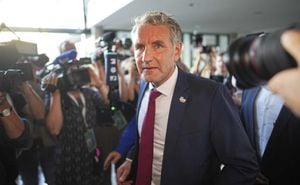The Green Party's election campaign reached its zenith recently at the Fischauktionshalle in Hamburg, as approximately 2,100 attendees gathered to hear influential speeches from party leaders. Foreign Minister Annalena Baerbock took the stage to deliver remarks laden with reflections from her three years as minister, prompting some to feel it resembled a farewell address more than a rallying call prior to the elections.
Accompanying her was Robert Habeck, the Minister of Economic Affairs and the party's chancellor candidate. Together, they aimed to motivate supporters just days before the highly contested federal election, illustrating the party's resolve to tackle the looming threats of right-wing extremism. "We have no four years left to waste," declared Habeck, signaling the urgent need for progressive policies over the next legislative period.
The event attracted attention not only for its high-profile speakers but also for the underlying tensions brewing across the political spectrum. The backdrop of the election includes various demonstrations, including significant protests against rightist ideologies scheduled to coincide with election day. Organizers anticipate showing solidarity and strength against growing populism.
During the event, Baerbock emphasized the importance of solidarity and open dialogue, stating, "Hamburg stands for openness, diversity, and solidarity". Her words were met with applause from the audience, which included staunch supporters of the Green Party and activists committed to combating far-right ideologies.
Prior to this rally, the Green Party had campaigned actively, knocking on around 1.35 million doors with ambitions to reach 1.5 million by election day. The grassroots approach is aimed at mobilizing voters who might be indifferent to traditional political campaigning. The leaders believe connecting personally with constituents can reinvigorate support for their platform, which highlights climate action, education, and affordable living.
Habeck did not miss the chance to critique his opponents, advising potential voters of the pitfalls of choosing the Social Democratic Party (SPD). He claimed the SPD is set to face considerable losses, which would weaken their bargaining power for progressive governance if elected. Likewise, Habeck did not hold back on criticizing the Christian Democratic Union (CDU), accusing them of espousing outdated policies: "The Union’s approach is reminiscent of beer coaster politics from the 1990s, incapable of addressing the 2030s challenges head-on," he remarked, invoking laughter and agreement from the crowd.
Notably, Baerbock and Habeck did address concerns surrounding the political climate, drawing attention to what they perceived as authoritarian movements threatening democratic values: “When other states say: 'My country first', we say: 'Europe united'”, said Baerbock, echoing sentiments of collective responsibility and cooperation amid global challenges.
Several disturbances marred Baerbock’s speech, including persistent interruptions from protestors, which saw one woman removed by police after her disruptive behavior overshadowed key messages. These instances reflected the charged atmosphere surrounding the political discourse leading up to the elections.
Although the speeches were powerful, the event served as both rallying point and reflection for the Green Party leaders as they contemplate the future ramifications of the upcoming elections. Potentially looming also over their minds were the results from simultaneous antifascist demonstrations taking place throughout Hamburg, with thousands expected to voice their opposition against right-wing politics on the city’s streets.
Looking at the broader electoral picture, more than 59 million eligible voters across Germany will exercise their rights on election day, with polling indicating the CDU leading, followed closely by the AfD, and the SPD and Greens each vying for relevance against tides of populism. The political balance is tenuous, and every vote could prove pivotal.
Hamburg itself will witness local elections just one week after the federal vote, setting the table for another round of campaign intensity. Both the SPD and Greens are projected to compete vigorously, each strategizing for effective coalition-building to secure stable governance.
With challenges on various fronts—particularly from the opposition and rising extremism—both Baerbock and Habeck understand the importance of winning the hearts and minds of voters, who are increasingly skeptical of traditional political narratives. For them, the stakes couldn’t be higher.
What's clear is the Green Party is investing considerable energy to galvanize support as they push through these final days of campaigning, aware of the significance their message holds not only for the current elections but also for the future of Germany's political framework amid pressures from the right.
Importantly, this election is about more than mere votes; it's about defining the values of openness and inclusivity versus the darker pull of division and fear. The Hamburg campaign finale was less of a head start and more of a clarion call for every citizen to engage—an invitation to choose, not just at the polls but for the kind of society they envision moving forward.



